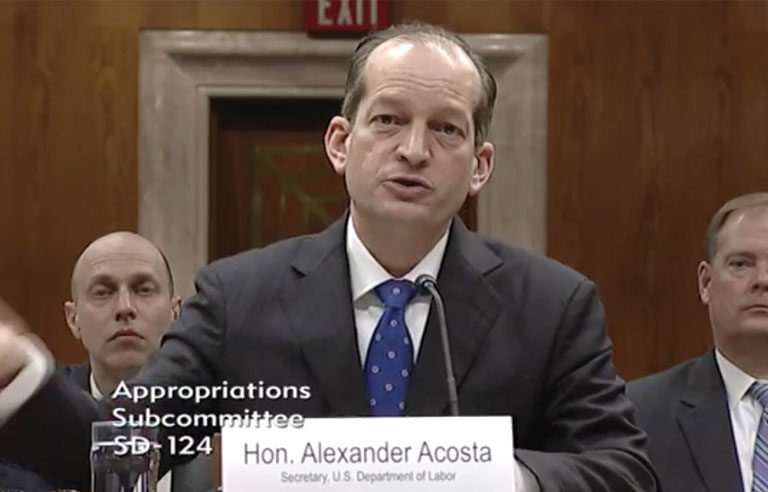‘Laws matter’: Acosta seeks budget increase for DOL enforcement activity

Washington — While President Donald Trump seeks another sizable cut to the Department of Labor’s budget, Secretary of Labor R. Alexander Acosta is attempting to boost enforcement funding in certain agencies, including OSHA.
During an April 12 hearing convened by the Senate Appropriations Committee’s Labor, Health and Human Services, Education, and Related Agencies Subcommittee, Acosta said that “laws matter. They have been passed by Congress. They are the laws of the land, and they need to be enforced. The men and women at the Department of Labor need the resources to enforce them.”
President Trump has proposed a $1.1 billion cut to DOL for fiscal year 2019, allocating $10.9 billion. The administration had allocated $9.7 billion for DOL in FY 2018 – a $2.4 billion cut – but the omnibus funding bill passed on March 23 allotted the department about $12.2 billion.
OSHA is in line to receive $549 million for FY 2019, a slight drop from $552.8 million in FY 2018. Acosta, meanwhile, has proposed a $6.1 million increase for the agency for federal enforcement and an additional 42 full-time equivalent employees to replenish compliance safety and health officer positions.
During the hearing, he voiced his support for data-gathering efforts required by OSHA’s injury and illnesses electronic recordkeeping rule, but said he has concerns about privacy.
“We are looking at methods where we can obtain this data while at the same time respecting the privacy of individuals,” Acosta said in response to a question from Sen. Tammy Baldwin (D-WI). “We are looking at methods where we can obtain the data en masse without individual identifying information because once we receive the data, it can eventually become subject to disclosure.”
Sen. Joe Manchin (D-WV) expressed his concern about rollbacks of safety measures by the Mine Safety and Health Administration, pointing out that 10 of the 19 coal miners who have died in 2017 are from his state. Manchin also called attention to air quality standards. “If we change the standards of air quality, I can guarantee you the black lung disease will continue to increase,” he said. “This is one way we had to fight that and try to stop that.”
Acosta reiterated that although a retrospective study for the respirable coal dust rule was listed on the latest regulatory agenda, that work was required by the 2014 regulation. MSHA administrator David Zatezalo cited the same reason during a Feb. 6 House Workforce Protections Subcommittee hearing.
Following up on Manchin’s questions, Sen. Shelley Moore Capito (R-WV) asked Acosta if MSHA has any programs of special emphasis to help curb miner fatalities. The secretary said that many are based on motor vehicle safety. In February, Zatezalo said powered haulage was a point of emphasis for MSHA this year.
Acosta said MSHA is focusing on “new rules or approaches that we can put into place to address some of those. In part, we have new miners that haven’t been underground before, so we need to be extra vigilant and extra careful in their education around safety issues. But it maybe that we need to look at some rules and warning signs around those vehicles.”
Post a comment to this article
Safety+Health welcomes comments that promote respectful dialogue. Please stay on topic. Comments that contain personal attacks, profanity or abusive language – or those aggressively promoting products or services – will be removed. We reserve the right to determine which comments violate our comment policy. (Anonymous comments are welcome; merely skip the “name” field in the comment box. An email address is required but will not be included with your comment.)

